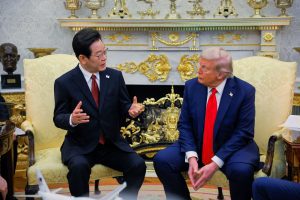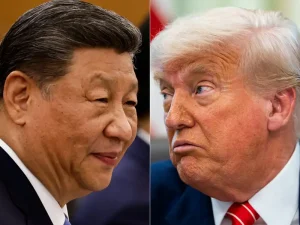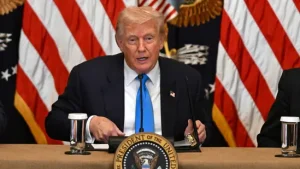Washington D.C. – President Donald Trump delivered a stern ultimatum to China on Monday, August 25, demanding either cooperation on magnet supplies or facing devastating economic consequences. Trump Issues A Warning To China with unprecedented severity, threatening a crushing 200 percent tariff that could reshape global trade dynamics and escalate existing tensions between the world’s two largest economies.
Unprecedented Tariff Threat Escalates Trade Tensions

The latest development in US-China relations saw Trump Issues A Warning To China reaching new heights of economic brinkmanship. Speaking during diplomatic meetings in Washington, Trump declared that America would impose a 200 percent tariff unless China provides essential magnet supplies to the United States.
This aggressive stance reflects growing concerns about China’s dominance in rare earth elements and critical supply chains that power modern technology. Trump Issues A Warning To China specifically targeting magnet supplies highlights America’s vulnerability in strategic materials essential for defense, technology, and renewable energy sectors.
Strategic Context Behind Magnet Supply Demands



China’s control over rare earth elements and magnetic materials has become increasingly sensitive as global powers recognize their strategic importance. Trump Issues A Warning To China over magnets underscores America’s determination to secure reliable access to these critical resources that power everything from electric vehicles to military equipment.
The 200 percent tariff threat represents one of the most severe trade measures proposed in recent US-China relations. Trump Issues A Warning To China with such extreme economic penalties demonstrates the administration’s willingness to risk significant economic disruption to achieve strategic objectives.
Diplomatic Balancing Act Amid Economic Threats
Despite the harsh economic rhetoric, Trump simultaneously expressed optimism about future US-China relations. Trump Issues A Warning To China was accompanied by promises of eventual diplomatic engagement, with the President indicating plans to visit China either this year or shortly thereafter.
Speaking during his meeting with South Korean President Lee Jae Myung, Trump revealed ongoing communications with Chinese President Xi Jinping. This diplomatic outreach contrasts sharply with the aggressive trade threats, suggesting a complex strategy combining pressure tactics with relationship-building efforts.
Strategic Card Game Between Superpowers



Trump’s comments revealed his perception of the US-China relationship as a high-stakes strategic competition. Trump Issues A Warning To China while simultaneously acknowledging that both nations possess significant leverage in their bilateral relationship.
The American President claimed that the United States holds “incredible cards” in this geopolitical game but expressed reluctance to deploy them fully. Trump suggested that using America’s most powerful leverage could “destroy China,” indicating awareness of the potentially catastrophic consequences of escalating trade wars beyond current levels.
Future Diplomatic Engagement Plans
Despite current tensions, Trump Issues A Warning To China was balanced with expressions of optimism about future bilateral relations. The President’s stated intention to visit China represents a potential de-escalation pathway, suggesting that current threats may be negotiating tactics rather than permanent policy positions.
Trump’s declaration that “we’re going to have a great relationship with China” indicates belief that current disputes can be resolved through direct diplomatic engagement. This approach combines maximum pressure tactics with eventual face-to-face diplomacy.
Nuclear War Prevention Claims
Beyond trade issues, Trump Issues A Warning To China occurred alongside broader claims about Trump’s role in preventing global conflicts. The President asserted that his election victory prevented a nuclear war between North and South Korea, positioning himself as a crucial peacemaking figure in East Asian security.
Also Read: PM Modi Tariff Stance In Ahmedabad: Strong Response To Crushing US Trade Pressure
Trump claimed that without his electoral success, North and South Korea would have engaged in nuclear conflict, with catastrophic consequences for the region. These assertions form part of broader efforts to establish credentials for potential Nobel Peace Prize consideration.
Self-Proclaimed Peacemaker Status


Trump Issues A Warning To China while simultaneously promoting his image as an international peacemaker. The President’s claims about preventing nuclear war reflect attempts to balance aggressive trade rhetoric with peacekeeping credentials.
This dual approach suggests Trump’s strategy of combining economic pressure with diplomatic engagement, presenting himself as both a tough negotiator and conflict prevention specialist. The timing of these claims alongside trade threats indicates coordinated messaging aimed at multiple audiences.
Regional Security Implications
Trump’s assertions about preventing Korean nuclear conflict add complexity to current China relations. Trump Issues A Warning To China occurs within broader regional security considerations, where American military presence and diplomatic influence play crucial roles in maintaining stability.
The President’s claim that America would have “entered the picture” in any Korean nuclear conflict underscores US military commitments in the region, adding strategic depth to current trade negotiations with China.
Economic Warfare Versus Diplomatic Solutions
The contrast between severe tariff threats and diplomatic outreach reveals the complexity of modern great power relations. Trump Issues A Warning To China exemplifies this balance between economic coercion and relationship maintenance that characterizes contemporary international politics.
Concluding Remarks
Trump’s latest ultimatum to China represents a critical moment in bilateral relations, combining unprecedented economic threats with promises of future cooperation. Trump Issues A Warning To China with 200 percent tariffs while planning diplomatic visits illustrates the complex dynamics shaping global trade and security relationships in an increasingly multipolar world.

